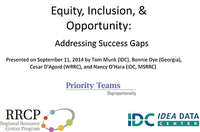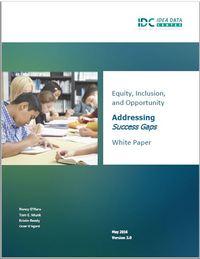Archived Resources
The Resource Library houses tools and products that were developed by IDC, developed with its collaborators, or submitted by IDC stakeholders. Search and filtering tools are available to help users navigate through the library.
Archived Resources 57 - 63 of 222
Format: Presentations
Equity, Inclusion, and Opportunity in Special EducationIn this webinar, which IDC staff presented for the University of Tennessee’s Boling Center for Developmental Disabilities, we first discuss the requirements in the IDEA related to disproportionality, describe methods for calculating disproportionality, and present data, both at the national level and for the state of Tennessee. The second part of the webinar introduces a research-based guidance document and self-assessment rubric designed to help schools and districts identify the root causes of "success gaps."
Format: Recordings
Equity, Inclusion, and Opportunity in Special Education WebinarIn this webinar, which IDC staff presented for the University of Tennessee’s Boling Center for Developmental Disabilities, we first discuss the requirements in the IDEA related to disproportionality, describe methods for calculating disproportionality, and present data, both at the national level and for the state of Tennessee. The second part of the webinar introduces a research-based guidance document and self-assessment rubric designed to help schools and districts identify the root causes of "success gaps."
Format: Presentations
Equity, Inclusion, and Opportunity: Addressing Success Gaps via the SSIP ProcessPresenters introduced a research-based guidance document and self-assessment rubric designed by OSEP's Disproportionality Priority Team to help districts and schools identify the root causes of "success gaps" for some groups of students, thereby helping to improve and equalize results for all students. As an example, presenters used Georgia's SSIP process, focused on graduation for students with disabilities.
Format: Guides, Papers, and Reports
Equity, Inclusion, and Opportunity: Addressing Success Gaps, White PaperThis white paper focuses on elements of equity, inclusion, and opportunity that can minimize or eliminate success gaps among different groups of students. It provides the research-based background that guided development of a complementary rubric that schools or districts can use to systematically examine the root causes of success gaps among groups of their students. The white paper has been updated recently and now includes considerations for children as young as preschool.
Format: Presentations
Equity, Inclusion, and Opportunity: Creating Educational Systems That Meet the Needs of All Groups of StudentsMany schools and districts have been identified as low performing or disproportionate because of disparities between subgroups on a variety of success measures. Other schools and districts are proactively trying to address identified success gaps. Presenters from IDC demonstrated IDC's Success Gaps Toolkit that can help schools and districts 1) prepare all of their students for success in college and careers by addressing success gaps, 2) collect and use quantitative and qualitative data for the purpose of root-cause analysis of those success gaps, and 3) focus attention on those root causes for the benefit of children and students in the lowest performing subgroups.
Format: Presentations
Equity, Inclusion, and Opportunity: Getting SSIP Results by Addressing Success GapsThe presentation provides a self-assessment rubric that can help states and local districts view their school/district programs and practices with an "equity" lens and help states and LEAs understand the reasons for discrepancies in outcomes between certain groups of students. Helpful handouts are included.
Format: Presentations
Evaluating Infrastructure ChangesDuring this presentation, the IDC Evaluation Team helped participants recognize current improvement strategies related to infrastructure development, understanding the value of evaluating infrastructure changes, and learning how to put the evaluation of infrastructure to practical use.








